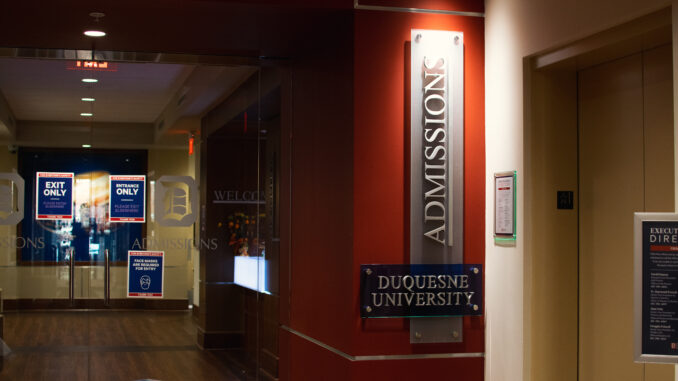

Gillian Fitzgerald | Staff Writer
11/19/2020
Each college student has the not-so-long ago memories of senior year of high school when they were ready to start their new lives in a world of freedom and opportunities (and, of course, parties).
And then there was the other side of things where those students actually had to work to get there. As a high school senior, the most pressing thing on one’s mind is usually college — and apparently, a pandemic.
Choosing a college is an important decision in a teenager’s life. It can impact their career, long-time friends, where they live and, more importantly, where they go after college.
Put all that pressure on top of a pandemic — no wonder they’re stressed out.
Many colleges in the area, unlike Duquesne, don’t have in-person tours anymore due to COVID-19. This presents unique challenges to potential students, who must make decisions about which school they see being their home for four years or more.
Sara Mitchell, a prospective Duquesne student and high school senior from Washington, PA, has been subject to this and is trying to go about the college application process as best she can during the COVID-19 pandemic.
“Most schools aren’t doing in-person tours, so it’s hard to tell what a college is actually like when it’s all virtual, because they just show all the good parts,” Mitchell said.
Attending high school that is still doing in-person classes five days a week, she hopes to be physically at school for college, as well, rather than all online — a setting many universities have opted toward this year.
The COVID-19 pandemic has brought new challenges to those applying to schools, as CDC guidelines discourage gatherings, including for SAT and ACT testing. Although test scores for schools have been more lenient because of this, Mitchell explained that schools now rely on a student’s GPA to gauge what kind of student they are, which creates more competition.
While Mitchell still plans on attending college, she has been specifically looking at places closer to home, as many rising college freshmen have been.
According to a poll done by Third Way and New America, the pandemic has tremendously impacted the way high school seniors think about college and decisions on enrolling. Of the 221 high schoolers polled, 41% of students said they are applying to schools closer to home due to the pandemic. Furthermore, 32% say COVID-19 has made them less likely to go to college, and 70% of them say higher education is not worth the costs to students anymore.
Junior Duquesne tour guide Aly Huth has been showing students around for almost two years, and she’s been able to see first hand the challenges potential students face as they look to commit to college during a pandemic, along with how things have changed in her job.
“It’s definitely different … it’s usually very visual but those visual cues are no longer there because we can’t bring them inside buildings,” Huth said.
Normally, students are able to see classrooms, the Power Center, dining halls and the Student Union. But during the pandemic, tours are done almost completely outdoors — the only place they are allowed to see inside is the model dorm room.
This poses a challenge for Huth’s job in getting students to see what it’s like to live at Duquesne without being able to fully experience that while touring.
“I have to get people to understand what it’s like to be on campus during COVID and before COVID because, obviously, that’s what we’re working towards, is getting campus back to the way it was beforehand,” Huth said. “So, you kind of have to give them a taste of what campus is like in both settings.”
Despite this change, Huth says prospective students are more energetic and enthusiastic than ever before. Because such few schools allow visits, being able to have an in-person tour is a different perspective for prospective students.
For high school students, a memorable part of the college application process is getting a glimpse into university life through tours and meeting with current students. But when a global pandemic threatens colleges everywhere, that also means it threatens high school seniors who are hoping to be the next-up freshmen.
As Huth tells those incoming students, what’s important is that they remember that they make that decision based on where they feel they fit best, especially with the effects of a global pandemic.
“They’re the ones who are going to be spending the four years there,” Huth says. “So I always tell them, as much as I would like them to choose Duquesne because this is where I found my home, it’s more important for them to find their home.”




